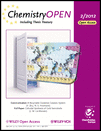
ChemistryOpen
Scope & Guideline
Igniting Innovation in Chemistry
Introduction
Aims and Scopes
- Synthetic Chemistry and Catalysis:
The journal publishes significant contributions in synthetic methodologies and catalytic processes, exploring new reactions, catalysts, and their applications in organic synthesis. - Materials Chemistry:
Research on the design, synthesis, and characterization of novel materials, including nanomaterials, composites, and polymers, is a prominent focus, highlighting their properties and applications in various fields. - Analytical Chemistry:
The journal includes studies on novel analytical techniques and methods for the characterization of chemical compounds, environmental monitoring, and biomedical applications. - Biochemical and Medicinal Chemistry:
There is substantial coverage of research aimed at understanding biological processes and developing new therapeutic agents, including studies on drug design, synthesis, and biological evaluation. - Environmental Chemistry:
Research addressing environmental issues, including pollution analysis, remediation techniques, and sustainable practices, is a vital area of interest, reflecting the journal's commitment to addressing global challenges. - Computational Chemistry:
The journal supports articles that utilize computational methods to study chemical systems, including molecular modeling, simulations, and theoretical investigations to predict chemical behavior.
Trending and Emerging
- Green and Sustainable Chemistry:
There is a noticeable increase in research dedicated to green chemistry principles, including the development of eco-friendly synthesis methods, waste reduction, and sustainable materials. - Nanotechnology and Nanomaterials:
The application of nanotechnology in various fields, including drug delivery, catalysis, and materials science, is rapidly growing, with numerous studies focusing on the synthesis and characterization of nanomaterials. - Electrochemistry and Energy Storage:
Research in electrochemical methods for energy storage, including batteries and supercapacitors, is on the rise, highlighting the journal's engagement with renewable energy solutions. - Bioconjugation and Drug Delivery Systems:
The development of advanced drug delivery systems, including targeted therapies and biomaterials, is increasingly prominent, reflecting a shift towards more effective medicinal chemistry. - Machine Learning and Artificial Intelligence in Chemistry:
The integration of computational methods with machine learning and AI for predictive modeling and data analysis in chemistry is an emerging trend, showcasing the journal's commitment to innovative methodologies.
Declining or Waning
- Traditional Organic Synthesis:
Research focusing solely on traditional organic synthesis techniques without innovative or green chemistry approaches appears to be declining, as the field shifts towards more sustainable practices. - Inorganic Coordination Chemistry:
The exploration of classical coordination compounds and their properties seems to be waning, with fewer studies published that do not incorporate modern applications or interdisciplinary approaches. - Classical Spectroscopy Techniques:
While still relevant, the prevalence of studies employing conventional spectroscopy methods without the integration of advanced techniques or novel applications is decreasing. - Static Theoretical Chemistry:
Theoretical studies that do not incorporate dynamic simulations or practical applications are becoming less common, reflecting a shift towards more applied computational chemistry. - Conventional Polymer Chemistry:
Research focused on traditional polymer synthesis and characterization without addressing environmental impact or novel applications is receiving less attention in recent publications.
Similar Journals
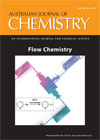
AUSTRALIAN JOURNAL OF CHEMISTRY
Exploring the frontiers of chemistry since 1948.The Australian Journal of Chemistry, with an ISSN of 0004-9425 and an E-ISSN of 1445-0038, is a distinguished publication from CSIRO PUBLISHING, dedicated to advancing the field of chemistry since its inception in 1948. Based in Australia, this journal serves as a platform for original research articles, reviews, and innovative studies that encompass a wide spectrum of chemical disciplines, aiming to foster communication and collaboration among researchers globally. Despite its Q3 ranking in the Chemistry (Miscellaneous) category and standing at rank #236 in Scopus’ general chemistry classification, it remains an essential resource for professionals and students seeking to stay informed about emerging trends and discoveries in chemistry. The journal does not offer open access, emphasizing the premium quality of peer-reviewed content that adheres to rigorous academic standards. By bridging theory and practice, the Australian Journal of Chemistry continues to play a crucial role in shaping the future of chemical sciences.
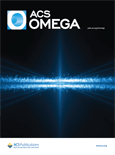
ACS Omega
Unlocking Knowledge, Fueling Innovation in Chemistry.ACS Omega is a prominent open-access journal published by the American Chemical Society that has been serving the global research community since its inception in 2016. With ISSN 2470-1343, it focuses on a wide array of topics within the realm of Chemistry and Chemical Engineering, making it a crucial platform for researchers and practitioners aiming to disseminate significant findings across these disciplines. The journal maintains an impressive standing, ranking in the Q2 quartile for both Chemical Engineering and Chemistry categories, highlighting its impact and relevance in contemporary research. Additionally, with its Scopus ranks placing it within the top 24% and 27% of General Chemistry and General Chemical Engineering respectively, ACS Omega continues to foster innovation and facilitate collaboration among scientists. As an Open Access journal, it ensures that research outputs are freely available to all, enhancing the accessibility and visibility of contributors’ work, thus playing a critical role in advancing scientific knowledge globally from its headquarters in Washington, D.C.

Canadian Journal of Chemistry
Advancing Chemistry Through Innovative ResearchWelcome to the Canadian Journal of Chemistry, a prominent publication dedicated to advancing the study of chemistry through original research and critical reviews. Published by Canadian Science Publishing, this journal has been a cornerstone of chemical research since its inception, covering a broad spectrum of topics within the field, including catalysis, organic chemistry, and general chemistry. With an ISSN of 0008-4042 and E-ISSN of 1480-3291, it provides a vital platform for researchers, professionals, and students to disseminate their findings and engage in scholarly discourse. Impact Factor is currently in development, with the journal classified in the Q4 category for catalysis and Q3 for miscellaneous chemistry fields, signifying its evolving contributions to the scientific community. The journal operates without an open access model, which ensures a rigorous peer-review process while maintaining subscription access for institutions and libraries. Located in Ottawa, Canada, the Canadian Journal of Chemistry continues to provide an invaluable resource for those dedicated to the scientific pursuit of chemistry, making significant strides in fostering interdisciplinary approaches and innovative research methodologies.

CHINESE JOURNAL OF CHEMISTRY
Fostering dialogue and discovery in chemistry.The CHINESE JOURNAL OF CHEMISTRY, published by WILEY-V C H VERLAG GMBH, is a distinguished peer-reviewed journal that has been contributing to the field of chemistry since its inception in 1990. With an impressive Q1 ranking in the Chemistry (miscellaneous) category and a Scopus rank of 67 out of 408, this journal is recognized for its rigorous scholarly standards and significant impact within the academic community. Renowned for publishing high-quality research, reviews, and insightful commentaries, the journal serves as a vital resource for researchers, professionals, and students keen on advancing their understanding of general chemistry and its applications. Although it does not offer open access, the journal remains an essential outlet for innovative chemistry research, attracting contributions from a global network of specialists. With its broad scope covering various aspects of chemistry and a commitment to fostering scientific dialogue, the CHINESE JOURNAL OF CHEMISTRY is poised to continue its role as a central pillar in the ever-evolving landscape of chemical sciences.
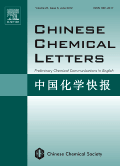
CHINESE CHEMICAL LETTERS
Connecting Ideas, Transforming Chemical Science.CHINESE CHEMICAL LETTERS, published by Elsevier Science Inc, is a premier journal in the field of chemistry, notably recognized for its focus on innovative research in multidisciplinary areas of the discipline. With its ISSN 1001-8417 and E-ISSN 1878-5964, this journal has established itself as a valuable resource for academics since its inception in 1996, with coverage extending to 2024. Categorized in the top tier (Q1) for Chemistry (miscellaneous), it ranks an impressive #37 out of 408 in Scopus's General Chemistry category, reflecting its significant influence and contribution to the field, with a remarkable 91st percentile ranking. Though it does not currently offer open access, CHINESE CHEMICAL LETTERS remains accessible to researchers through institutional subscriptions and provides crucial insights and advancements in chemical research, making it an essential publication for professionals and students aiming to stay at the forefront of chemical sciences.
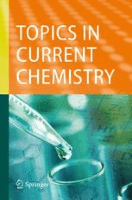
Topics in Current Chemistry
Unveiling the latest breakthroughs in chemistry.Topics in Current Chemistry is an esteemed peer-reviewed journal published by SPRINGER INT PUBL AG, renowned for its contributions to the field of chemistry. Established in 1974 and currently spanning its convergence through various years, this journal remains pivotal for researchers seeking to explore the latest developments in chemical sciences. With an impressive Q1 classification in the miscellaneous chemistry category and a Scopus rank placing it in the top 10% of its field, it serves as a crucial platform for disseminating high-quality research. The journal’s diverse scope covers a wide array of contemporary chemical topics, catering to a global audience of academic and professional chemists. Although not Open Access, its content can be accessed through institutional subscriptions, ensuring broad reach and engagement within the scientific community. Researchers and students alike will find Topics in Current Chemistry an invaluable resource for keeping abreast of cutting-edge advancements and trends in chemistry.

JOURNAL OF CHEMICAL RESEARCH
Unveiling New Horizons in Chemical Research.JOURNAL OF CHEMICAL RESEARCH, published by SAGE PUBLICATIONS LTD, serves as a pivotal platform for scholars and practitioners in the field of Chemistry. With its ISSN 1747-5198 and E-ISSN 2047-6507, this journal has established itself as a reliable source of innovative research since its inception in 2000. The journal's comprehensive scope encompasses various facets of chemical research, providing a broad spectrum of articles that foster scientific advancement and technological innovation. Ranked in the Q3 tier of miscellaneous chemistry journals in 2023, with a Scopus rank of #246 out of 408, it represents a solid outlet for emerging and established researchers alike. Although currently not an open-access journal, its rigorous peer-review process ensures that only high-quality studies are published, catering to the academic and professional community's demand for credible and impactful findings. Positioned in the vibrant research landscape of the United Kingdom, the JOURNAL OF CHEMICAL RESEARCH is dedicated to expanding the frontiers of chemical sciences and is an essential resource for anyone committed to advancing this dynamic field.

EUROPEAN JOURNAL OF ORGANIC CHEMISTRY
Empowering Discovery in Organic ScienceThe EUROPEAN JOURNAL OF ORGANIC CHEMISTRY (ISSN: 1434-193X; E-ISSN: 1099-0690), published by WILEY-V C H VERLAG GMBH in Germany, stands as a crucial platform for disseminating innovative research in the fields of organic, physical, and theoretical chemistry. With its inception dating back to 1998 and converging expertise until 2024, this esteemed journal has achieved a notable reputation, earning a Q2 rank in both Organic Chemistry and Physical and Theoretical Chemistry categories as of 2023, indicating its vital contribution to the academic community. Researchers and professionals will benefit from its rigorous peer-reviewed articles, which foster advancement in chemical sciences, while students can leverage its wealth of knowledge to enhance their learning. Although currently not an open-access journal, the content produced is invaluable for those looking to stay at the forefront of chemical research.

CHEMICAL RESEARCH IN CHINESE UNIVERSITIES
Connecting Ideas and Advancements in ChemistryCHEMICAL RESEARCH IN CHINESE UNIVERSITIES is a prominent academic journal dedicated to the dissemination of high-quality research in the field of chemistry and related educational methodologies. Published by HIGHER EDUCATION PRESS, this journal has established itself as a vital resource for researchers and professionals looking to stay at the forefront of chemical sciences. With an impressive impact factor and ranked in the Q2 quartile for both Chemistry and Education categories, it highlights significant advancements while maintaining rigorous peer-review standards. The journal's ISSN is 1005-9040 and its E-ISSN is 2210-3171, ensuring broad accessibility to its global readership. Although it does not offer open access, its contributions are vital to understanding the dynamics of chemistry research and education within and beyond China. With converged publication years from 1999 through to 2024, CHEMICAL RESEARCH IN CHINESE UNIVERSITIES continues to be an essential platform for innovative studies and critical discussions in the expanding realm of chemistry.
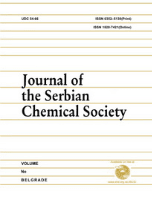
JOURNAL OF THE SERBIAN CHEMICAL SOCIETY
Connecting Chemists, Inspiring DiscoveriesJOURNAL OF THE SERBIAN CHEMICAL SOCIETY, an esteemed publication in the field of chemistry, is published by the SERBIAN CHEMICAL SOCIETY and has been an essential platform for the dissemination of research since 1930. With an ISSN of 0352-5139, this Open Access journal is dedicated to fostering communication and collaboration among chemists worldwide, making its contents readily accessible to researchers, professionals, and students alike. Based in Serbia, the journal features a wide range of topics within the domain of general chemistry, as reflected in its Scopus rankings, which place it in the 34th percentile among its peers. The journal's engagement with the global scholarly community is further underscored by its consistent publication history since 1985, with coverage extending through to 2024. As the journal continues to evolve, it remains committed to promoting high-quality research and advancing the field of chemistry.